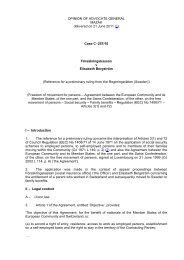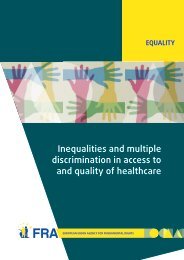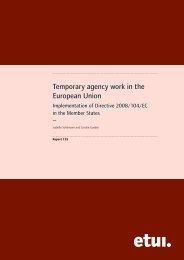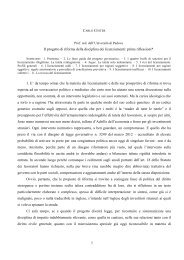Study on non-legislative initiatives for companies to promote gender ...
Study on non-legislative initiatives for companies to promote gender ...
Study on non-legislative initiatives for companies to promote gender ...
Create successful ePaper yourself
Turn your PDF publications into a flip-book with our unique Google optimized e-Paper software.
104 Gender equality <strong>initiatives</strong><br />
To make sure that all interested pupils are able <strong>to</strong> attend e-learning, <strong>on</strong>line tu<strong>to</strong>rials<br />
and support are provided free of charge. Especially in the beginning of the project this<br />
was an important help <strong>for</strong> the young women and men working <strong>on</strong> the technical projects,<br />
because there were not so many lectures available <strong>for</strong> free <strong>on</strong>-line as they are now.<br />
Mo<strong>to</strong>rola Inc. stresses that it is important <strong>to</strong> provide free and time flexible training <strong>to</strong><br />
ensure that every<strong>on</strong>e and especially those who cannot af<strong>for</strong>d <strong>to</strong> invest much m<strong>on</strong>ey in<br />
their educati<strong>on</strong> or who have other resp<strong>on</strong>sibilities besides school (traditi<strong>on</strong>ally women)<br />
can attend training.<br />
3.4 Rec<strong>on</strong>ciliati<strong>on</strong><br />
Meanwhile, especially with regard <strong>to</strong> multinati<strong>on</strong>al <strong>companies</strong> (with USA origin) some<br />
work-life procedures have become comm<strong>on</strong> practices throughout their European<br />
branches as well. Most of the <strong>companies</strong> analysed in the course of this research project<br />
offer the following rec<strong>on</strong>ciliati<strong>on</strong> possibilities (which also impact significantly <strong>on</strong> the<br />
retenti<strong>on</strong> of female staff):<br />
• Telecommuting / flexible work place<br />
• flexible work time<br />
• part-time working / job-sharing<br />
• child care facilities<br />
As the extent <strong>to</strong> which these policies are implemented in the branches of the<br />
multinati<strong>on</strong>al <strong>companies</strong> in various European countries is subject <strong>to</strong> nati<strong>on</strong>al legislati<strong>on</strong>,<br />
the approaches pursued may slightly differ between countries. Moreover, these policies<br />
require a positi<strong>on</strong>/job modalities that enable them (e. g. telecommuting is not possible<br />
<strong>for</strong> a cashier) and positive assessment of the employee’s will and ability <strong>to</strong> per<strong>for</strong>m (as<br />
the company <strong>to</strong> a certain extend gives up c<strong>on</strong>trol over employees).<br />
Rec<strong>on</strong>ciliati<strong>on</strong> measures are in most cases (when appropriate) targeted at men and<br />
women. Whether in fact men or women benefit more from such rec<strong>on</strong>ciliati<strong>on</strong> policies<br />
<strong>to</strong> a large degree depends <strong>on</strong> the percepti<strong>on</strong> of society, the company culture and<br />
the individuals themselves; e. g. in the Nordic countries, child care is rather regarded as<br />
obligati<strong>on</strong> of pers<strong>on</strong>s/employees within a certain age group (male and female), whereas<br />
in other European countries child care still appears <strong>to</strong> be more or less attributed <strong>to</strong><br />
women. For the latter countries it is indeed true that women who are mothers are given<br />
the chance <strong>to</strong> work through rec<strong>on</strong>ciliati<strong>on</strong> measures.<br />
Procter & Gamble Corp. uses <strong>to</strong> the term “<strong>gender</strong> diversity” when talking about <strong>gender</strong><br />
issues at the workplace. The <strong>gender</strong> diversity measures which Procter & Gamble<br />
Corp. provide address the field of rec<strong>on</strong>ciliati<strong>on</strong> and basically include: locati<strong>on</strong> free<br />
roles; flexible work arrangements (reduced work schedule/part-time); working from<br />
home/teleworking; pers<strong>on</strong>al leave of absence (e. g. three m<strong>on</strong>ths sabbatical due <strong>to</strong><br />
pers<strong>on</strong>al reas<strong>on</strong>s); family leave up <strong>to</strong> 12 m<strong>on</strong>ths in order <strong>to</strong> look after family dependents<br />
(children, partner, parent or other family relatives) or care of dependents when<br />
travelling (in<strong>for</strong>mati<strong>on</strong> resources and financial support <strong>to</strong> care <strong>for</strong> dependents in case of<br />
n<strong>on</strong>-routine business demands/travelling). These measures are available <strong>for</strong> male and<br />
female employees.<br />
Eli Lilly has as well implemented a range of programmes <strong>to</strong> allow <strong>for</strong> flexibility at the<br />
workplace, e. g. flextime, flexweek, part-time, job sharing or telecommuting. Participa-
















